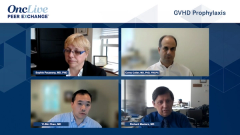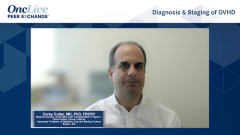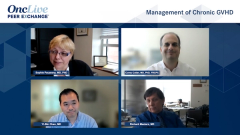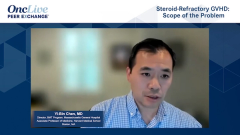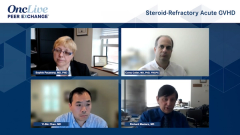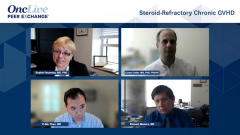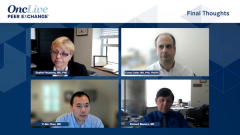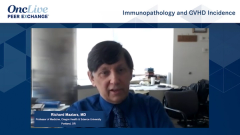
Steroid-Refractory Chronic GVHD
Sophie Paczesny, MD, PhD, provides an overview of the drug ibrutinib for use in steroid-refractory chronic graft-vs-host disease (GVHD). She elicits thoughts from the panelists on how they envision this drug being used.
Episodes in this series
Corey Cutler, MD, PhD, FRCPC: That is one of the major pushes from the NIH [National Institutes of Health] consensus in chronic graft-vs-host disease[GVHD]; moving there is to get more into preemptive and prophylactic approaches, so that you’re not in the situation where you’re dealing with advanced disease where nothing is going to work.
Sophie Paczesny, MD, PhD: You have to be optimistic, because in the past 3 to 4 years, we had FDA-approved drugs in GVHD. We never had FDA-approved drugs in GVHD before; that is a good thing. The first one that was approved in GVHD …. was ibrutinib. It works as Bruton tyrosine kinase [BTK], and IL-2-inducible T-cell kinase [ITK]. It targets both the T cells and the B cells. FDA approval was based on [David] Miklos’s [MD, PhD], Blood paper of 2017. It was a small cohort, 35 patients, but was enough at the time for the FDA to approve it. It works for some centers and for some patients. There have been a lot of adverse effects, and I am not sure it’s still used by all centers. I know that it is used a lot in peds [pediatrics] in chronic GVHD, but not so much in adults. I want to know what your experience is with this.
Corey Cutler, MD, PhD, FRCPC: Our experience is a little underwhelming in comparison to the results in the clinical trial. That was a very select group of chronic GVHD subjects. We have recently started looking at our outcomes in ibrutinib-treated patients outside of clinical trials, and it is not the same as what the trials are reporting. A small Japanese experience is about to be reported that looks favorable, but I would say -that is not the experience that we’ve had outside of the clinical trial.
Richard Maziarz, MD: One thing with ibrutinib is if you look at the trial itself, it was stringent as far as eligibility criteria. The FDA label was far broader, and a lot of people then used ibrutinib as a treatment for chronic GVHD in circumstances that wouldn’t have been eligible for the trial. A lot of the real world experience is not based on scientific evidence.
Yi-Bin Chen, MD: I would agree that our real world experience has not been as optimistic as the trial had suggested. You always must look at the single-arm trials being a little skeptical, especially in chronic GVHD where the assessment of response is subjective at times. Single-arm trials make it difficult to truly have confidence in. That being said, we are grateful for the access, and I have had some patients who have responded, there is no question about that. The toxicities are there and the cumulative immunosuppression is there with ibrutinib. It’s approved for second-line [therapy] after steroids; it is not our second-line agent of choice at the moment with the other alternatives that we have.
Sophie Paczesny, MD, PhD: Talking about a small cohort …. randomized trial, we can all be impressed by the REACH3 presented at ASH [American Society of Hematology], also presenting at ASTCT [American Society for Transplantation and Cellular Therapy] by Stephanie Lee, [MD, MPH], and Robert] Zeiser, [MD], et al., for the European part. Compared to the best available therapy, the primary outcome of overall response rate for phase 3 was 50% versus 26%. I was personally impressed by this data; it is the first time we have a positive randomized clinical trial in chronic GVHD. What’s your experience in real life?
Richard Maziarz, MD: One of the things about REACH3 was it was best available therapy. If you looked at how people were treated, there was a significant number of patients who got photopheresis, patients who got various drug intervention, and there were patients who got mycophenolate, which was already shown to fail in phase 3 trials. It was basically at an institutional level of how patients should be managed. Part of the insights we also saw during REACH3 is that there wasn’t strong guidance on how patients should be managed; for the issue of opportunistic infections, there wasn’t standardization for supportive care. Either way, they got a positive trial in a complex setting.
Yi-Bin Chen, MD: In the same way, we can say best available therapy, just like in REACH-2, is not the perfect control. I’m not sure there was in this setting. The only way to do this trial, which the investigators should be applauded for doing the trial, was to do it this way. The results are impressive in terms of response rate, failure-free survival, symptoms and so forth—we can’t argue with that. We all expect ruxolitinib to be approved in this setting this year and to be able to treat our patients with it. We routinely use ruxolitinib for second-line therapy for chronic graft-vs-host disease, and while it’s certainly not a home run here, you can notice the CR [complete response] rates to know it’s not a home run. A lot of patients have definitely benefitted from it in terms of response and steroid reduction.
Richard Maziarz, MD: I do expect the approval to be obtained, but I also hope that earlier application of ruxolitinib for chronic resistant GVHD will be beneficial and we may see better responses. At least in our institutional experience, we have had frequent discussions with payers trying to get ruxolitinib approved. That’s a delay in therapy. Or, patients may have coverage, but have major financial gaps; we then must enroll them in the expanded access program. Either way, it would be 3 or 4 weeks that sometimes go by from when I would wish to start the drug to when I can deliver. With approval, I will expect that lead time to drop, but I’m hoping that earlier application will provide better outcomes for our patients when we do use it earlier.
Yi-Bin Chen, MD: I think that will be possible soon; it depends on if we can risk stratify the right population. We’ll hopefully get to a steroid-free JAK [Janus kinases] inhibitor chronic GVHD trial soon.
Transcript edited for clarity.


